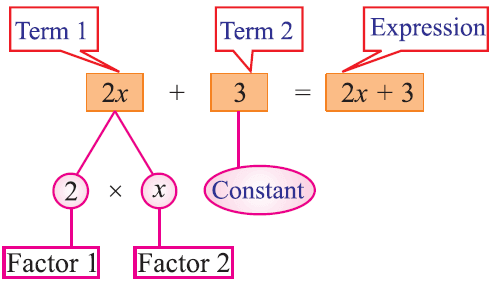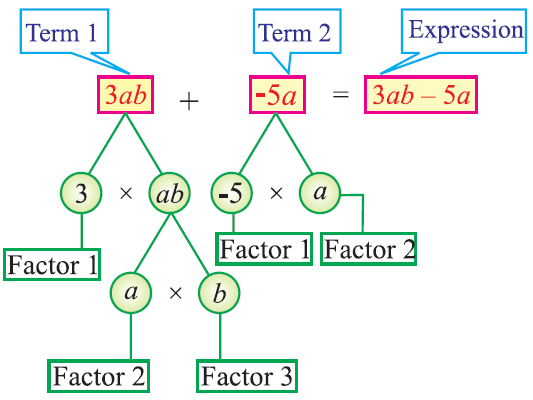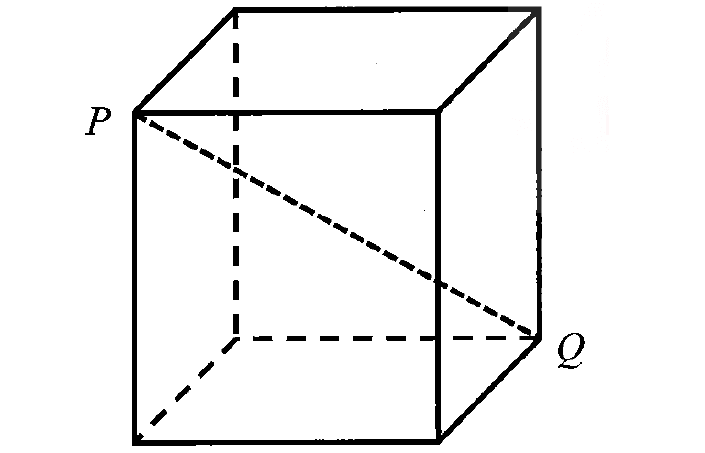TERMS FACTORS AND COEFFICIENTS
A single variable or a constant or a combination of these as a product or quotient forms a term.
Examples :
5, -a, 3ab, 21/7, ........... etc
Terms can be added or subtracted to form an expression. In the expression 2x + 3 the term 2x is made of 2 factors and 2 and x while 3 is a single factor.

Consider the expression 3ab – 5a. It has two terms 3ab and -5a. The term 3ab is a product of factors 3, a and b. The term -5a is a product of -5 and a. The coefficient of a variable is a factor or factors.
Examples :
In the term 3ab;
(i) the coefficient of ab is 3 (ii) the coefficient of a is 3b
(iii) the coefficient of b is 3a.
In the term –5a the coefficient of a is –5

Example 1 :
Identify the number of terms and coefficient of each term in the expression.
x2 y2 - 5 x2 y + (3/5) xy2 - 11
Solution :
In the given expression, we have four terms.
Term 1 ==> x2 y2
Term 2 ==> - 5 x2 y
Term 3 ==> (3/5) xy2
Term 4 ==> -11
Coefficient of 1st term = 1
Coefficient of 2nd term = -5
Coefficient of 3rd term = 3/5
Since the last term is not having any variable, it is a constant term.
Example 2 :
Identify the number of terms, coefficient and factors of each term in the expression.
3abc - 5ca
Solution :
The given expression contains two terms.
Term 1 ==> 3abc
Term 2 ==> -5ca
|
|
Terms |
Coefficients |
Factors |
|
1) |
3abc |
3 |
a, b and c |
|
2) |
-5ca |
-5 |
c and a |
Example 3 :
Identify the number of terms, coefficient and factors of each term in the expression.
1 + x + y2
Solution :
The given expression contains three terms.
Term 1 ==> 1
Term 2 ==> x
Term 2 ==> y2
|
|
Terms |
Coefficients |
Factors |
|
1) |
1 |
- |
- |
|
2) |
x |
1 |
x |
|
3) |
y2 |
1 |
y and y |
Example 4 :
Identify the number of terms, coefficient and factors of each term in the expression.
3x2 y2 - 3xyz + z3
Solution :
The given expression contains three terms.
Term 1 ==> 3x2 y2
Term 2 ==> - 3xyz
Term 2 ==> z3
|
|
Terms |
Coefficients |
Factors |
|
1) |
3x2 y2 |
3 |
x2 and y2 |
|
2) |
- 3xyz |
-3 |
x, y and z |
|
3) |
z3 |
1 |
z, z and z |
Example 5 :
The coefficient of x4 in -5x7 + (3/7) x4 - 3x3 + 7x2 - 1
Solution :
The coefficient of x4 is 3/7.
Example 6 :
If A = 4x2 + 7x - 1 and B = -x2 - 5x + 3, then what is (3/2)A - 2B?
Solution :
A = 4x2 + 7x - 1 and B = -x2 - 5x + 3
To find (3/2)A, we have to multiply each coefficient of polynomial A by 3/2.
= (3/2) [4x2 + 7x - 1]
= 6x2 + (21/2)x - (3/2) ------(1)
To find 2B, we have to multiply each coefficient of polynomial by 2.
= 2(-x2 - 5x + 3)
= -2x2 + 10x + 6 -------(2)
(1) - (2)
= 6x2 + (21/2)x - (3/2) - (-2x2 + 10x + 6)
= 6x2 + (21/2)x - (3/2) + 2x2 - 10x - 6
= 8x2 + (21/2)x - 10x - (3/2) - 6
= 8x2 + (21 - 20/2)x + (-3 - 12)/2
= 8x2 + (1/2)x - (15/2)
Example 6 :
(2x2 + 3x - 4)(3x + 2) = 6x3 + ax2 - 6x - 8
In the given equation, a is a constant. If the equation is true for all values of x, what is the value of a ?
a) 4 b) 9 c) 13 d) 16
Solution :
(2x2 + 3x - 4)(3x + 2) = 6x3 + ax2 - 6x - 8
To solve for a, we have to equate the coefficients of like terms.
(2x2 + 3x - 4)(3x + 2) = 6x3 + 9x - 12x + 4x2 + 6x - 8
= 6x3 + 4x2 + 15x - 12x - 8
= 6x3 + 4x2 + 3x - 8
6x3 + 4x2 + 3x - 8 = 6x3 + ax2 - 6x - 8
By comparing the coefficient of x2, we get a = 4
Option a is correct.
Example 7 :
The equation
(36x2 + 16x - 21)/(tx - 4) = (-9x + 5) - [1/(tx - 4)]
is true for all values of x for which x ≠ 4/t, where t is a constant. What is the value of t ?
a) -20 b) -4 c) 4 d) 12
Solution :
(36x2 + 16x - 21)/(tx - 4)
Dividing this by long division is not possible, so by observing the given possible values in the options, let us consider option b.
t = -4
= (-9x + 5) + [1/(tx - 4)]
Applying t = -4, we get
= (-9x + 5) - [1/(-4x - 4)]
= [(-9x + 5)(-4x - 4) - 1]/(-4x - 4)
= 36x2 - 20x + 36x - 20 - 1
= 36x2 + 16x - 21
Since we get the same terms that we have in the left side, the required value of t is -4, which is option b.
Kindly mail your feedback to v4formath@gmail.com
We always appreciate your feedback.
©All rights reserved. onlinemath4all.com
Recent Articles
-
Digital SAT Math Problems and Solutions (Part - 151)
Apr 26, 25 11:18 AM
Digital SAT Math Problems and Solutions (Part - 151) -
AP Calculus BC Problems with Solutions
Apr 26, 25 05:49 AM
AP Calculus BC Problems with Solutions -
Digital SAT Math Problems and Solutions (Part - 150)
Apr 25, 25 11:46 AM
Digital SAT Math Problems and Solutions (Part - 150)
